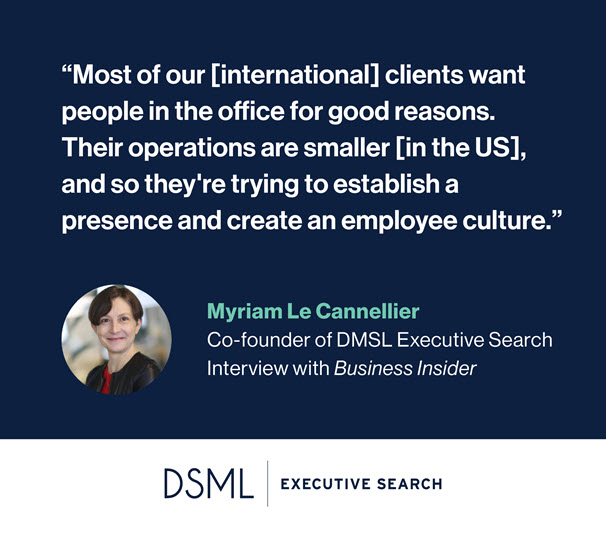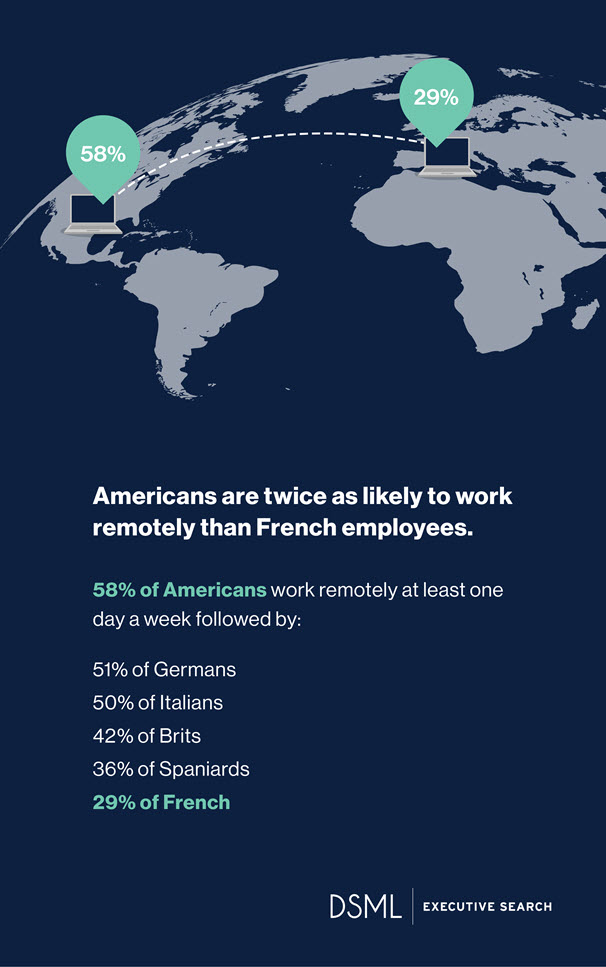The need for remote work created by COVID-19 is no longer a workplace mandate. However, candidates’ expectations versus client expectations regarding work environment are still largely in a state of flux. At DSML Executive Search, we are seeing this still affecting our clients that are recruiting for European subsidiaries in the USA.
Many candidates at the c-suite level still want remote or hybrid work. However, hiring managers are starting to expect more traditional work in physical offices. A recent report from Harvard Business Review discovered that managers find work from home less productive, while employees believe it improves their daily output.
All this begs the question: are remote work environments a sustainable expectation in today’s c-suite recruiting market?
According to Myriam Le Cannellier, co-founder of DMSL Executive Search in Chicago, maybe not.
“Most of our [European] clients want people in the office for good reasons,” she told Business Insider. “Their operations are smaller [in the US], and so they’re trying to establish a presence and create an employee culture.”
 Recruiting c-suite and vice-presidential-level jobs for European subsidiaries in the US, Myriam understands the delicate balance between remote work and employer expectations. She believes cultural differences have a large impact on work environment in executive recruiting, and urges European companies to strike a balance between need and desire.
Recruiting c-suite and vice-presidential-level jobs for European subsidiaries in the US, Myriam understands the delicate balance between remote work and employer expectations. She believes cultural differences have a large impact on work environment in executive recruiting, and urges European companies to strike a balance between need and desire.
“We try to communicate to clients that they need to be a little more flexible,” she reported. “Otherwise, they won’t fill the roles.”
The remote work vs in-person role debate boils down to two conflicts of interest: candidate expectations and HR European cultural norms.
The Problem of Remote Work and European Cultural Norms
Many European companies have a strict view of how and where work should be done. Favorable opinions from managers related to remote work have been steadily declining since 2018, and only 5% of the population worked remotely before the pandemic. It’s not hard to see why many companies want their employees back in the office — especially if they are in the c-suite or higher-ranking employees.
However, many job candidates no longer want to work in an office five days per week. Many have become used to the flexibility of telecommuting, and no longer see the value in an in-person only job. More than 61% of French employees want the right to work remotely, or at least the flexibility to work from home some days per week. This number is much higher in the United States, which complicates the playing field for European companies hiring in the US.
 Today, America leads the pack in remote work opportunities worldwide. In a recent study performed by the Think Tank Jean-Jaures, Americans are twice as likely to work remotely than French employees.
Today, America leads the pack in remote work opportunities worldwide. In a recent study performed by the Think Tank Jean-Jaures, Americans are twice as likely to work remotely than French employees.
The statistics are equally surprising for other European countries:
- 58% of Americans work remotely at least one day a week, followed by:
- 51% of Germans
- 50% of Italians
- 42% of Brits
- 36% of Spaniards
- 29% of French
Much of this paradigm is shaped by work environments developed through cultural expectations. However, its universal application may become problematic when recruiting for European subsidiaries in the US. A deep understanding of cultural norms and expectations will be imperative in making the right hire for your business — especially if you are looking for a c-suite executive or high-ranking candidate overseas.
Determining if Remote Work is Viable for Your Executive Role in Executive Search Recruitment
The viability of remote work for your executive role is largely based on your needs and expectations. However, there are some general principles that highlight the practicality of remote work for your c-suite employees. This can be broken down into two categories: sustainable and unsustainable.
Executive roles where remote work environments are sustainable
Not every c-suite role requires in-person office attendance. This is particularly obvious for sales personnel, especially during the earliest days of your subsidiary’s growth. Your VP or Director of Sales should be flexible and agile, traveling the country in search of new leads. Their ability to work remotely can save the expense of a physical office until your company is ready to put down roots.
Executive roles where remote work environments are unsustainable
Some executive roles are complex and multifaceted, requiring a physical presence within your subsidiary. For example, manufacturing facilities and industrial plants need in-person or on-site labor. This ensures the proper supervision of your plant and grants greater visibility into day-to-day operations. After all, how would it benefit your brand-new subsidiary if the Site Director or Leader of Manufacturing were too remote from their teams? Could they be missing a connection with the rest of your team?
Determining the Right Fit for Your Subsidiary in the USA
Determining the suitability of remote work for an executive role is no easy task — and even more complex for European companies performing executive search recruitment. It’s critical for your organization to be flexible in the negotiation process and look for ways to appease managers and candidates alike.
Consider equity and fairness across the hierarchy of your company, and be willing to meet top applicants in their place of need. You may need to consider a hybrid model, which is fast becoming a solid compromise in the negotiation phase. Finance roles, especially CFOs or VPs of finance, thrive in a hybrid environment. Two or three days of remote work per week could provide a strong incentive to qualified candidates.
If you’re looking to identify high-performance candidates who are open to your expectations of an executive environment, reach out to the professionals at DSML. We are a highly awarded CEO executive search firm with offices in Boston and Chicago, and would be more than willing to compliment your search with seasoned advice and modern best practices. Contact us today to learn more about our executive search recruitment process.

